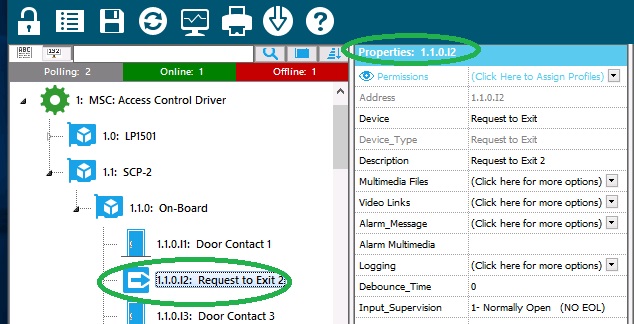Request to Exit Properties
Request to Exit Properties
Request to Exit (REX or RTE) devices are used to allow free egress (no card read needed) out of the door. By default each reader module assigns at least one (1) Request to Exit (REX). Depending on the type of sub-controller two (2) Request to Exit devices may be shown in the hardware tree. The Request to Exit is generally address points I2 (input 2) and I4 (input 4). I4 will only be shown if the reader module is multiple reader capable.
- Address - The physical address of the Request to Exit (REX) devices is automatically assigned within the Access Control Security Application. If the reader module has two (2) readers the addressing for the Request to Exit (REX) devices will be I2 for reader one (1) and I4 for reader two (2).
- Device_Type - The type of device attached to the sub-controller. There are six (6) different types of devices and include; Reader, Monitor Point, Control Point, Door Strike, Door Contact and Request to Exit (REX). The Device_Type may only be changed once the point has been disassociated through Door_Definitions located under the reader's properties. The ability to change the Device_Type is only available for the Aero hardware platform. To modify the Device_Type highlight the reader from the hardware tree. Click on the drop down arrow to the right of Door_Definitions and set the Request To Exit value to None. Highlight the Request to Exit, click the drop down arrow to the right of the Device_Type flag and select the Device_Type from the pick list.
- Description - A description of the device, used to easily identify the location or function of the device. The description will display on Event Manager any time an event occurs at that point.
- Multimedia Files - Video / Media that can be associated to the device and called up by right-mouse clicking on the events related to this device. To associate a Multimedia File, click on the drop down arrow to the right of the Multimedia File tag. Click the green plus sign to add a new multimedia file. Click on the plus sign to the left of Description and assign a description in the text field provided. Click the drop down arrow to the right of the Multimedia tag and browse to the location of the saved multimedia file.
- Video Links - Associate a camera to certain events of this device. Used to setup recording on a particular camera during particular event(s). Please note the Access Control Security software must be licensed for the video module in order to utilize this feature. The camera must be previously configured for use in the system before the camera can be assigned to a point. For video configuration options please see help section Video Configuration. To associate a video link to the Request to Exit, click on the drop down arrow to the right of the Video Links tag. Click on the drop down arrow to the right of the Camera Address tag and select the camera to be associated to the point. Please note the use of video by event is only available for certain video manufacturers. If the model used does not support this functionality, the camera will display for all events. Contact Technical Support for information regarding what manufacturers this is available for.
- Alarm_Message - A text field that is associated to the device when it goes into alarm state. This text field should be informative in describing what type of alarm has occurred. To create an Alarm message, click on the drop down arrow to the right of the Alarm_Message tag. Type the custom message in the text field provided. Click the green check mark to save changes. To exit without saving click on the blue x.
- Alarm_Multimedia - The sound that will occur when the alarm goes into an alarm state. Note: this feature requires the use of a sound card and speaker installed on the computer. To select the Alarm_Multimedia for the device, click on the drop down arrow to the right of the Alarm_Multimedia tag and select a wave file.
- Logging - Allows for device specific logging, select the related event then select a Log Type.
- Debounce_Time - A sensitivity setting for inputs. A low debounce setting requires the system to receive this number of consecutive reads from an input prior to reporting a change of state.
- Input_Supervision - Determines if the input will be wired normally open, normally closed, with or without End of Line resistance (EOL). The Request to Exit Input_Supervision is defaulted in the Access Control software to normally open with no EOL. If the Request to Exit is wired differently in the field, the technician will need to change the value of the Input_Supervision to reflect the correct wiring.